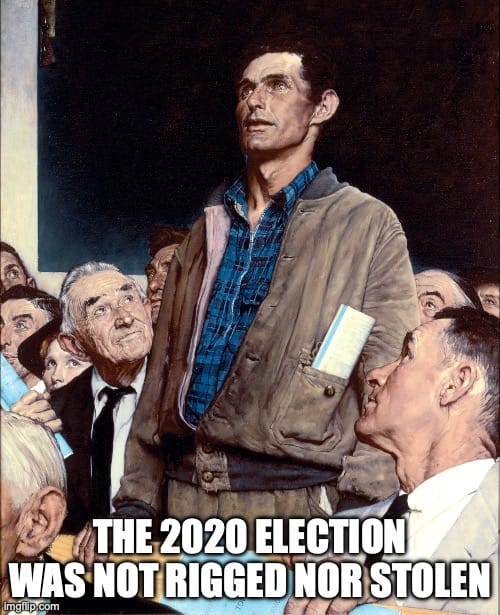The Lessons - and Heroes - of the House Un-American Activities Committee

“We are what we always were in Salem, but now the little crazy children are jangling the keys of the kingdom, and common vengeance writes the law.” - Arthur Miller, The Crucible
Hello! Two months have gone by since my last newsletter post. 🙈 In that time, Congress - the Senate and the House, now! - held three hearings airing grievances about a "Censorship Industrial Complex" that doesn’t exist. The President went to war with Harvard, possibly because of a mail fuck-up, and issued a memorandum targeting a colleague I very much admire, Chris Krebs, because he “baselessly denied that the 2020 election was rigged and stolen.” And three days ago Secretary of State Marco Rubio, whose own attempt at a presidential campaign was once targeted by Russia, declared that his agency’s efforts to counter foreign interference were really part of an authoritarian effort to destroy free speech in America. He promised a “GEC Files” exposé of the censorious wrongdoers.
These events, along with attacks on law firms, on other universities (like Columbia), and on civil society orgs, follow very similar patterns: they accuse the targets of violations of some value — being pro-DEI, anti-anti-semitism, or acknowledging the reality of the 2020 election — and then demand concessions. The claims are often transparently bad faith, but the institution struggles to respond. Because while farcical, they aren’t just empty theater: this is a coordinated campaign to punish political opponents through procedural harassment. At a minimum, the target will have to expend significant time and money fighting back.
Having been on the receiving end of inane Congressional inquiries, lawfare, and smears, I have a some familiarity with the MAGA bullshit machine, its procedural morass, and the chilling effect that it creates. The chilling effect splits people off from their institutions, colleagues, and the broader — this is one of its most pernicious effects, and something that does not have to happen. The targeted do not have to hunker and cower.
There are ways to fight back against these types of attacks — history, in fact, offers a clear guide.
This week I published an essay about reading I’ve done over the past year, digging into transcripts and books on the thirty year history of the House Un-American Activities Committee (HUAC). It’s up at Lawfare: Process as Punishment: An American History of Political Spectacle.
I didn’t know that HUAC had lasted for 30 years; I’m not a historian. But I found reading these transcripts to be a confirmation of my early intuition, then experience, that exoneration will not come from turning over documents and staying quiet.
The essay looks at some of the ways that HUAC achieved its objectives.
Exposure as punishment:
ACLU lawyer and former committee target Frank Donner distilled HUAC’s legacy in one line. Writing in his 1961 book “The Un-Americans”—as HUAC was still active—he observed that it “spent the most money, called the most witnesses, published the most pages, visited more places, ruined more lives and [was] responsible for the least legislation of any Committee in Congress.” But HUAC’s lack of legislation should not be mistaken for a lack of impact. Rather, it was a committee focused exclusively on exposing its targets—and exposure was enough.
The voluntary compliance of institutions:
"At the height of HUAC’s power, the accusation alone was the punishment. No charges nor verdict were necessary—just being called before the committee was enough to end careers. Professors, filmmakers, and activists were not tried or convicted of crimes; they were simply named, put on a list, and rendered unemployable… HUAC didn’t need to enforce its judgment directly—it was enforced by proxy. Universities fired faculty. Hollywood studios blacklisted actors and screenwriters. Unions expelled members. Professional associations cut ties. The blacklist wasn’t dictated by law—it was a product of fear, a consequence of institutions choosing self-preservation over resistance.”
But more importantly, it highlights American heroes, like Pete Seeger, Arthur Miller, and others who provided a model of how to resist effectively. The spell of the committee began to break when witnesses switched from compliance to a strategy of open defiance – to using the spectacle of a HUAC hearing to their advantage.
On strategic defiance as the essential response:
What ultimately ended HUAC’s reign was not compliance, but defiance. Witnesses stopped cooperating. They stopped treating the committee with deference. They stopped treating its inquiries as serious. They recognized it as spectacle—and they made the spectacle work for them instead. In 1960, when left-wing activist and Soviet affairs analyst William Mandel was called in front of the committee to testify on leftist agitation, its members expected meek apologies. Instead, Mandel delivered a blistering rebuke to those assembled—and spoke to the countless Americans watching, listening to, and reading the news. “I am sorry,” he said, not to his inquisitors, but to the American people. “I am sorry that this committee is dividing the nation.” His testimony included a memorable statement of defiance: “If you think I will cooperate with you in any way, you are insane.”
These historical lessons are urgently relevant in this moment of intimidation targeting universities, civil society, cybersecurity firms, nonprofits, and even individual researchers for political retribution.
To understand the moment, perhaps, and how to fight back effectively, read the full piece on Lawfare:
→ Process as Punishment: An American History of Political Spectacle
Please share with anyone who you think might find this helpful — particularly with colleagues in academia and civil society who might find themselves in the spotlight.